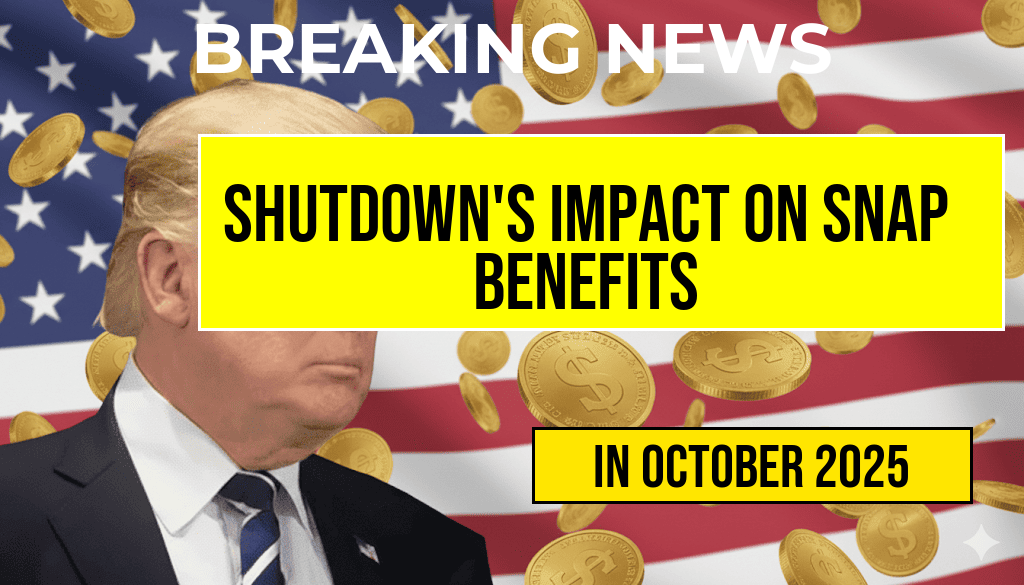The looming threat of a government shutdown has raised concerns across various sectors, particularly among millions of Americans relying on Supplemental Nutrition Assistance Program (SNAP) benefits and food stamp assistance. If congressional negotiations fail to reach an agreement before the deadline, millions of families could face disruptions in crucial food aid. While the precise fallout depends on the duration of the shutdown, experts warn that even short-term closures could lead to delays or reductions in benefit distribution. This situation underscores the fragile nature of social safety net programs and the potential consequences of political impasses on vulnerable populations.
Understanding the Impact of a Government Shutdown on SNAP
The SNAP program, formerly known as food stamps, is administered by the U.S. Department of Agriculture (USDA) and provides monthly assistance to millions of low-income individuals and families. During a government shutdown, the continuity of these benefits hinges on whether Congress allocates emergency funds or extends current appropriations. Historically, some essential USDA functions have continued temporarily, but the process is not guaranteed, leading to uncertainty for recipients.
How Benefits Are Distributed and What Changes During a Shutdown
- Automatic benefit issuance: SNAP benefits are usually distributed via Electronic Benefit Transfer (EBT) cards, with payments scheduled monthly. If the shutdown occurs after the issuance date, recipients often continue to receive benefits without interruption for that cycle.
- Delayed or missed payments: If new funding is not approved, some recipients may experience delays in the next cycle, potentially leaving them without assistance for days or weeks.
- State-level contingency plans: Many states have reserves or contingency plans to mitigate the impact, but these are limited and vary widely in scope.
Historical Precedents and Their Lessons
During past shutdowns, such as those in 2018 and 2019, the USDA managed to continue benefit distribution for a short period, but delays and administrative challenges emerged. In some cases, recipients experienced temporary lapses in aid, leading to increased food insecurity. The Congressional Budget Office (CBO) has projected that extended shutdowns could significantly strain the food assistance safety net, especially for those who rely solely on SNAP for their nutritional needs. These disruptions often disproportionately affect children, the elderly, and disabled individuals.
Potential Consequences for Food Security and Public Health
Disruptions in SNAP benefits can have immediate and long-term effects on community health. Without reliable access to food, vulnerable populations face increased risks of malnutrition, worsened health conditions, and heightened stress levels. Local food banks and charities often see spikes in demand during shutdown periods, but these resources are not sufficient to fully compensate for federal aid gaps.
Economic Ripple Effects
| Impact Area | Description |
|---|---|
| Local Retailers | Reduced purchasing power for food, leading to decreased sales and potential layoffs. |
| Household Food Security | Increased food insecurity for millions, especially in low-income communities. |
| Healthcare Costs | Potential rise in health issues related to malnutrition and stress, increasing public health expenses. |
Government Responses and Policy Options
Congressional leaders have debated various measures to prevent or mitigate the impacts of a shutdown on social programs like SNAP. Some lawmakers advocate for emergency funding that would sustain benefits temporarily, while others question the fiscal sustainability of expanding aid during budget impasses. The USDA has indicated that, in the absence of appropriations, some administrative functions might be curtailed, but essential services related to benefits distribution could continue under existing authority.
Legal and Administrative Considerations
- Continuity of benefits: Emergency authorities may allow benefits to be distributed even if appropriations lapse, but this depends on legislative provisions.
- State-level interventions: States may implement their own measures to cover benefits temporarily, but these are limited and vary significantly.
- Long-term solutions: Legislation such as the Farm Bill and appropriations acts are critical to ensuring ongoing support for SNAP and related programs.
What Recipients Should Know
Individuals relying on SNAP benefits should stay informed through official channels such as their state agencies and the USDA. While some delays are possible, recipients are encouraged to plan accordingly, including budgeting for potential gaps. Many community organizations also provide resources and assistance during periods of federal disruption. Upcoming legislative actions could determine whether benefits are maintained without interruption.
For more on the federal budget process and social safety net programs, visit the Wikipedia page on the U.S. federal budget or consult official USDA updates at USDA Food and Nutrition Service.
Frequently Asked Questions
What is the impact of a government shutdown on SNAP benefits?
During a government shutdown, SNAP benefits may be temporarily disrupted or delayed, potentially affecting recipients’ ability to access food assistance promptly. However, some states may continue to distribute benefits based on existing funds.
Will food stamp assistance continue during a shutdown?
In many cases, food stamp assistance programs are funded through federal reserves, allowing distribution to continue for a limited period. Nevertheless, extended shutdowns could jeopardize ongoing benefits and future distributions.
How long can SNAP benefits be sustained during a government shutdown?
The duration depends on federal funding reserves and state management. Typically, SNAP benefits can be sustained for a few weeks, but prolonged shutdowns may result in delays or suspension of benefits.
Are there any new policies or changes to food stamp eligibility during a shutdown?
Generally, no new policies are introduced during a government shutdown. However, eligibility criteria and benefit issuance may be affected if federal agencies face staffing shortages or funding issues.
What should recipients do if their SNAP benefits are delayed or disrupted?
If SNAP benefits are delayed, recipients should contact their local assistance office for guidance and explore emergency food resources. It’s also advisable to stay informed through official government updates regarding the shutdown status.

Leave a Reply